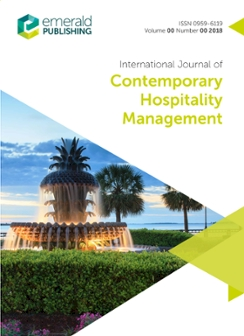Understanding brand reputation: a case study of Chinese wineries
IF 9.1
1区 管理学
Q1 HOSPITALITY, LEISURE, SPORT & TOURISM
International Journal of Contemporary Hospitality Management
Pub Date : 2024-01-11
DOI:10.1108/ijchm-07-2023-1057
引用次数: 0
Abstract
Purpose Exploring the determinants of a winery brand reputation (BR) and how those determinants interact is vital for the sustainable development of wineries as well as the growth of the wine industry as a whole. This study aims to test an integrated model to better understand the observed measurement constructs of winery brand reputation, including collective reputation (CR), wine label (WL), expert opinion (EO), social media advertising (SMA) and consumer wine knowledge (CWK). Design/methodology/approach In-depth interviews, an expert panel review and a pilot study were conducted to examine and improve the observed variables. A questionnaire survey was conducted as the main data source for the study. A total of 616 valid questionnaire responses were collected from 102 cities in mainland China and Hong Kong, Macao and Taiwan from December 2021 to April 2022. Structural equation modeling was conducted for the data analysis. Findings This study supported 9 of the 18 proposed theoretical hypotheses. WL, EO and SMA had positive effects on BR. CWK was found to have a moderating effect on the relationship between expert opinions/social media advertising and brand reputation. Research limitations/implications The results of this study can guide wine practitioners, researchers and administrators in brand development, label regulation and consumer education. Originality/value To the best of the authors’ knowledge, this is the first attempt to examine the determinants of winery brand reputation among Chinese wine consumers. This study explains the mechanism of winery brand reputation, demonstrating the dynamics and effects of the observed measurement constructs on brand reputation.了解品牌声誉:中国葡萄酒厂案例研究
目的探索酒庄品牌声誉(BR)的决定因素以及这些决定因素如何相互作用,对于酒庄的可持续发展以及整个葡萄酒行业的发展至关重要。本研究旨在测试一个综合模型,以更好地理解所观察到的酒庄品牌声誉的测量结构,包括集体声誉(CR)、葡萄酒标签(WL)、专家意见(EO)、社交媒体广告(SMA)和消费者葡萄酒知识(CWK)。研究的主要数据来源是问卷调查。从 2021 年 12 月至 2022 年 4 月,在中国大陆和港澳台地区的 102 个城市共收集到 616 份有效问卷。研究结果本研究支持了 18 个理论假设中的 9 个。WL、EO 和 SMA 对 BR 有积极影响。研究局限性/意义本研究的结果可以为葡萄酒从业者、研究人员和管理者在品牌发展、标签监管和消费者教育方面提供指导。本研究解释了酒庄品牌声誉的机制,展示了所观察到的测量建构对品牌声誉的动态影响。
本文章由计算机程序翻译,如有差异,请以英文原文为准。
求助全文
约1分钟内获得全文
求助全文
来源期刊
CiteScore
16.90
自引率
31.50%
发文量
239
期刊介绍:
The International Journal of Contemporary Hospitality Management serves as a conduit for disseminating the latest developments and innovative insights into the management of hospitality and tourism businesses globally. The journal publishes peer-reviewed papers that comprehensively address issues pertinent to strategic management, operations, marketing, finance, and HR management in the field of hospitality and tourism.

 求助内容:
求助内容: 应助结果提醒方式:
应助结果提醒方式:


